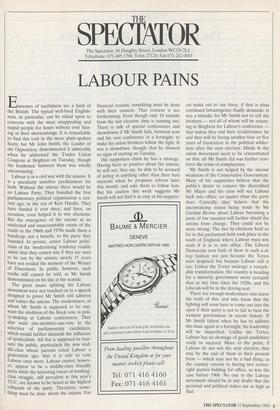SPECTAT im OR
The Spectator, 56 Doughty Street, London WC1N 2LL Telephone: 071-405 1706; Telex 27124; Fax 071-242 0603
LABOUR PAINS
Extremes of tactfulness are a fault of the British. The typical well-bred English- man, in particular, can be relied upon to converse with the most unappealing and stupid people for hours without ever hint- ing at their shortcomings. It is remarkable to find this trait in the more plain-spoken Scots; but Mr John Smith, the Leader of the Opposition, demonstrated it admirably when he addressed the Trades Union Congress at Brighton on Tuesday, though the bonhomie between them was wholly unconvincing.
Labour is in a civil war with the unions. It Is a peculiarly sensitive predicament for both. Without the unions there would be no Labour Party. They founded the first parliamentary political organisation a cen- tury ago, in the era of Keir Hardie. They have funded it ever since, and have, on occasion, even helped it to win elections. But the emergence of the unions as an unelected and unaccountable estate of the realm in the 1960s and 1970s made them a handicap, not a benefit, to the party they founded. In private, senior Labour politi- cians of the 'modernising' tendency readily admit that they cannot win if they are seen to be run by the unions; nearly 15 years have not eroded the memory of the Winter of Discontent. In public, however, such truths still cannot be told, as Mr Smith demonstrated on his day at the seaside.
The great issues splitting the Labour movement were not touched on in a speech designed to prove Mr Smith still admires and values the unions. The modernisers, of whom Mr Smith is supposed to be one, want the abolition of the block vote in poli- cy-making at Labour conferences. They also want one-member-one-vote in the selection of parliamentary candidates. which would further diminish the influence of syndicalism. All this is supposed to reas- sure the public, particularly the new mid- dle-class whose parents voted Labour a generation ago, that it is safe to vote Labour once more. Labour cannot, howev- er, appear to be a middle-class friendly party while the hectoring voices of working- class struggle, still prevalent at this year's TUC, are known to be heard in the highest tribunals of the party. Therefore, some- thing must be done about the unions. For financial reasons, something must be done with their consent. That consent is not forthcoming. Even though only 18 months from the last election, time is running out. There is talk of special conferences and showdowns if Mr Smith fails, between now and his own conference in a fortnight, to make his union brothers follow the light. It was a showdown, though, that he showed no signs of starting on Tuesday. His supporters claim he has a strategy. Having been so positive about the unions, he will not, they say, be able to be accused of acting in anything other than their best interests when he proposes reform later this month, and asks them to follow him. But his caution this week suggests Mr Smith will not find it as easy as his suppor - ers make out to use force, if that is what continued intransigence finally demands. It was a mistake for Mr Smith not to tell the brothers — not all of whom will be return- ing to Brighton for Labour's conference that unless they end their recalcitrance, he and they will be facing another four or five years of frustration in the political wilder- ness after the next election. Minds in the union movement need to be concentrated on this; all Mr Smith did was further rein- force the sense of complacency.
Mr Smith is not helped by the intense weakness of the Conservative Government. Many of his supporters believe that the public's desire to remove the discredited Mr Major and his crew will see Labour back into office, no matter what the party does. Cynically, they believe that the unconvincing noises being made by Mr Gordon Brown about Labour becoming a party of low taxation will further shield the unions from change. They could not be more wrong. The two by-elections held so far in this parliament both took place in the south of England, where Labour must win seats if it is to win office. The Liberal Democrats won both of them in such a de trop fashion not just because the Tories were despised, but because Labour still is too. Unless the Tories undergo a remark- able transformation, the country is heading for a minority government more certainly than at any time since the 1920s, and the Liberals will be in the driving seat.
There are enough modernisers who know the truth of this, and who know that the fighting will soon have to come out into the open if their party is not to fail to beat the weakest government in recent history. If Mr Smith falters when he has to address this issue again in a fortnight, his leadership will be imperilled. Unlike the Tories, Labour has no shortage of good candidates ready to succeed. More to the point, if Labour do not win the next election, that may be the end of them in their present form — which may not be a bad thing, as the country returns to having two centre- right parties bidding for office, as was the case before 1906. No one in the Labour movement should be in any doubt that the personal and political stakes are as high as that.


















































 Previous page
Previous page